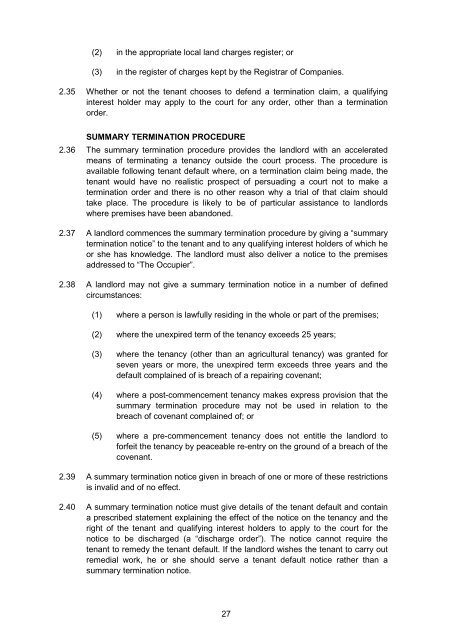Termination of Tenancies for Tenant Default - Law Commission
Termination of Tenancies for Tenant Default - Law Commission
Termination of Tenancies for Tenant Default - Law Commission
You also want an ePaper? Increase the reach of your titles
YUMPU automatically turns print PDFs into web optimized ePapers that Google loves.
(2) in the appropriate local land charges register; or<br />
(3) in the register <strong>of</strong> charges kept by the Registrar <strong>of</strong> Companies.<br />
2.35 Whether or not the tenant chooses to defend a termination claim, a qualifying<br />
interest holder may apply to the court <strong>for</strong> any order, other than a termination<br />
order.<br />
SUMMARY TERMINATION PROCEDURE<br />
2.36 The summary termination procedure provides the landlord with an accelerated<br />
means <strong>of</strong> terminating a tenancy outside the court process. The procedure is<br />
available following tenant default where, on a termination claim being made, the<br />
tenant would have no realistic prospect <strong>of</strong> persuading a court not to make a<br />
termination order and there is no other reason why a trial <strong>of</strong> that claim should<br />
take place. The procedure is likely to be <strong>of</strong> particular assistance to landlords<br />
where premises have been abandoned.<br />
2.37 A landlord commences the summary termination procedure by giving a “summary<br />
termination notice” to the tenant and to any qualifying interest holders <strong>of</strong> which he<br />
or she has knowledge. The landlord must also deliver a notice to the premises<br />
addressed to “The Occupier”.<br />
2.38 A landlord may not give a summary termination notice in a number <strong>of</strong> defined<br />
circumstances:<br />
(1) where a person is lawfully residing in the whole or part <strong>of</strong> the premises;<br />
(2) where the unexpired term <strong>of</strong> the tenancy exceeds 25 years;<br />
(3) where the tenancy (other than an agricultural tenancy) was granted <strong>for</strong><br />
seven years or more, the unexpired term exceeds three years and the<br />
default complained <strong>of</strong> is breach <strong>of</strong> a repairing covenant;<br />
(4) where a post-commencement tenancy makes express provision that the<br />
summary termination procedure may not be used in relation to the<br />
breach <strong>of</strong> covenant complained <strong>of</strong>; or<br />
(5) where a pre-commencement tenancy does not entitle the landlord to<br />
<strong>for</strong>feit the tenancy by peaceable re-entry on the ground <strong>of</strong> a breach <strong>of</strong> the<br />
covenant.<br />
2.39 A summary termination notice given in breach <strong>of</strong> one or more <strong>of</strong> these restrictions<br />
is invalid and <strong>of</strong> no effect.<br />
2.40 A summary termination notice must give details <strong>of</strong> the tenant default and contain<br />
a prescribed statement explaining the effect <strong>of</strong> the notice on the tenancy and the<br />
right <strong>of</strong> the tenant and qualifying interest holders to apply to the court <strong>for</strong> the<br />
notice to be discharged (a “discharge order”). The notice cannot require the<br />
tenant to remedy the tenant default. If the landlord wishes the tenant to carry out<br />
remedial work, he or she should serve a tenant default notice rather than a<br />
summary termination notice.<br />
27

















